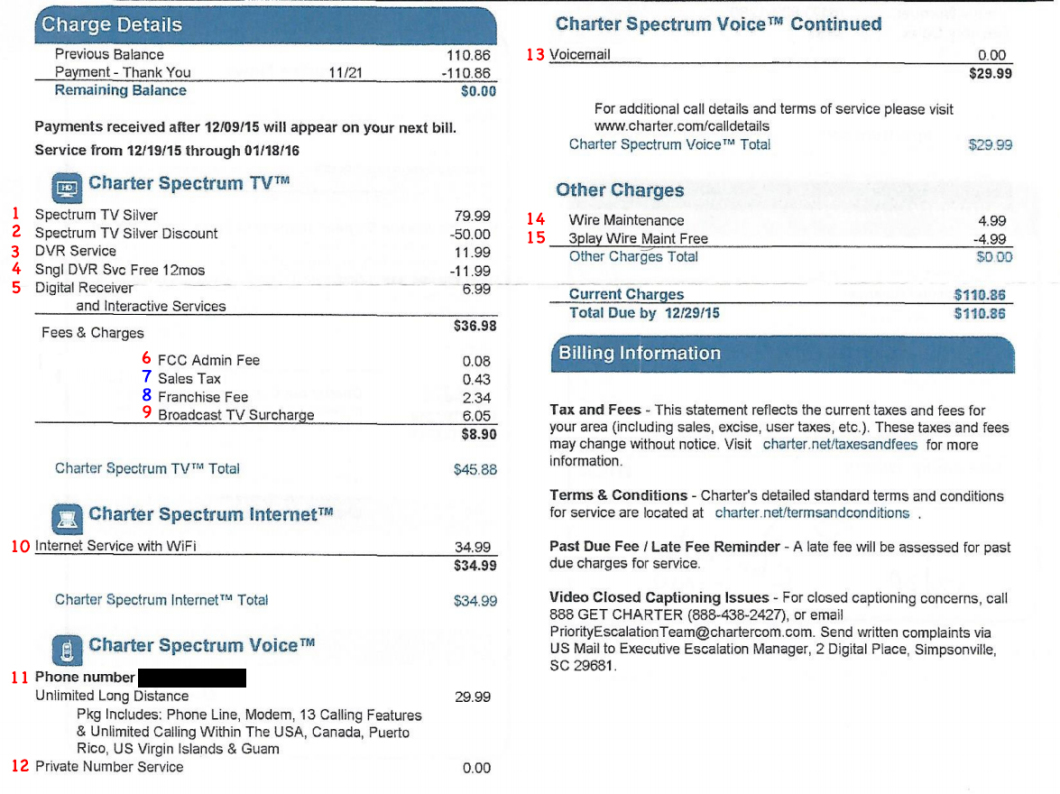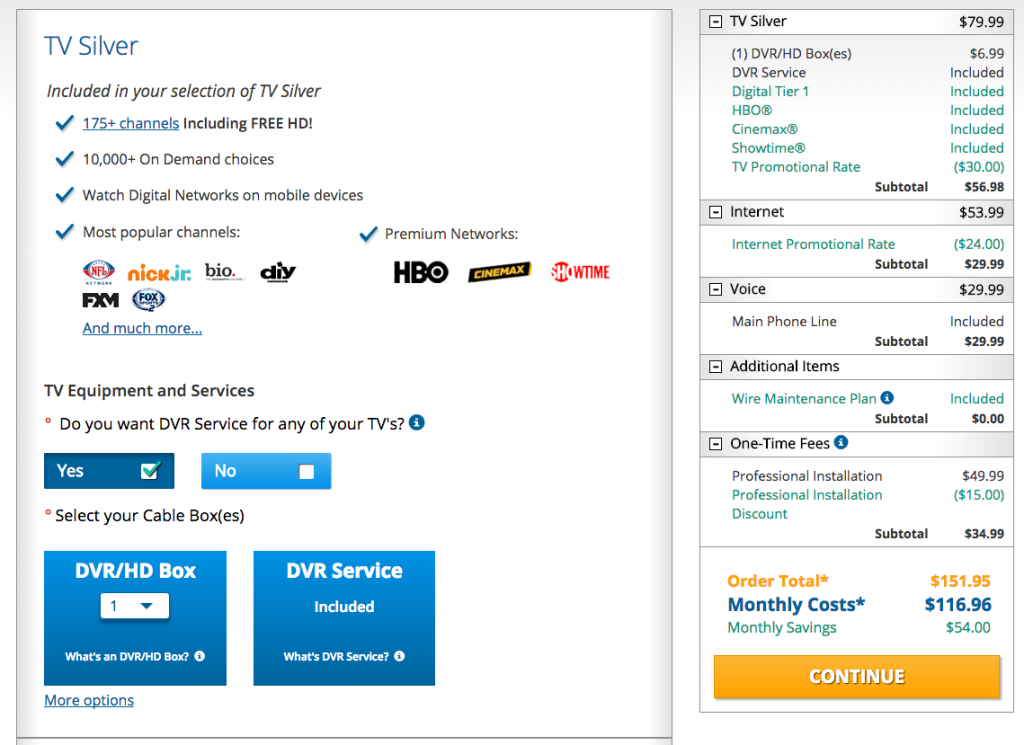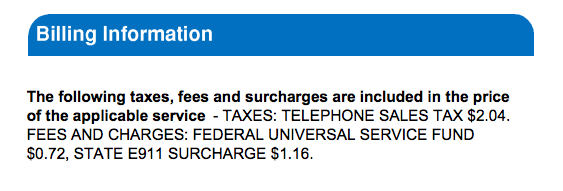The Consumerist Guide To Understanding Your Charter Cable Bill
When you sign up for telecom services — some combination of TV, broadband, and/or phone — from your cable company, you’re told you’ll pay something like $49 or $99 a month… and yet the price you actually pay can be as much as 40% or more on top of that, thanks to a heap of sometimes confusing charges and fees. Which ones do you blame the government for, and which are made up by your cable company? One cable company at a time, we’re using real customers’ bills to break it down. We’ve already looked at Comcast, TWC, and DirecTV, so now it’s Charter’s turn.
The below bill was provided to Consumerist by a real-life Charter customer who subscribes to a triple-play TV, broadband, and phone package for a nominal promotional rate of $109.97 per month.
Due to short-term negotiated discounts, this customer’s monthly charge for services manages to come in under the stated rate, at $94.97. Of their total $110.86 bill, $15.89 — about 14% — visibly comes in from various taxes, surcharges, and/or fees.
What happened to the taxes?
Somewhat unusually, Charter customers’ bills also include completely invisible taxes, surcharges, and fees that are rolled into other line items and cannot be accurately accounted. In fact before breaking down the bill, we need to note that among all the providers whose bills we’ve covered (and the providers whose bills we’ve received and read, but have yet to cover), Charter’s billing is the most noticeably weird.
Charter breaks out federal, state, or local taxes and fees for some services (TV) but not for others (voice). Also, depending where you live and when you signed up for services, the taxes, fees, and surcharges that do appear may be listed under different sections of the bill or not at all.
While their procedure does result in many fewer line items for consumers, it does produce more confusing bills overall, and make it harder to compare against other providers in a truly apples-to-apples kind of way.
To better understand each of these fees, we’ll go through a real bill line by line and explain what each item covers:

Charter Spectrum TV
1.) Spectrum TV Silver
Charter advertises their packages in a sneaky way. They only put a price on the lowest triple-play bundle, which says “From $29.99/month each for 12 months when bundled.” That “each” is important, because it means that the base price is more like $90 than $30.
The Silver package then says it costs $20 more than the Select package, and the Gold is $20 more than that. If you do the math, then, the Triple Play Silver bundle is advertised at a rate of $109.97 per month.
Going through Charter’s shopping process to build a package similar to this consumer’s, in the same area where they live, results in Charter breaking down the provided services like so:
This is the price you expect to pay, and the one you sign up for.
2.) Spectrum TV Silver Discount
Charter’s tactic for encouraging consumers to buy bundles is to charge high but produce enormous discounts. This $50 discount on the TV service line item is how Charter squares their bundle pricing for this consumer.
3.) DVR Service
4.) Single DVR Service Free 12 Months
Again with the “discount” tactics: Charter theoretically charges $12 a month to enable DVR service on your cable box, but to make the bundle price work that fee gets zeroed out.
5.) Digital Receiver (and Interactive Services)
This is the fee Charter charges for your set-top box. When the FCC says consumers are paying $20 billion a year in box rental fees, these are the kind of fees they mean.
This subscriber only has one television, so, only one fee.
6.) FCC Admin Fee
The FCC collects mandatory annual fees from cable operators; that’s part of where the commission gets it budget from.
The FCC rules permit — but do not technically require — cable operators to recover the regulatory fees from subscribers in monthly installments. However, in the real world, every provider in some way collects this fee — whether it’s called a regulatory fee, an admin fee, or just an FCC fee — directly from consumers.
7.) Sales Tax
Tax: one of the rare certainties in life. Rates are all over the place depending where you live but the vast majority of jurisdictions in the U.S. impose some kind of communications sales tax on pay-TV services.
Googling “[state name] communications tax” should be the fastest way to find the pay-TV service tax rates in your state. Rates and requirements may also vary widely based on county or municipality.
8.) Franchise Fee
Cable franchise agreements vary widely from state to state or even from city to city. What nearly all of them have in common is that the entity granted the franchise (in this case, Charter) must pay the entity granting the franchise (the state or local government or utility board) a fee, typically equal to about 5% of revenues gained from each customer.
In most states and cities (or at least, the ones that we’ve looked at), the language of the law states that providers may recover the fee from their customers directly. However, this subscriber’s local law says that providers shall directly recover the fee from consumers. In other words, while it might have been a choice made by TWC in one of our other guides, in this particular instance Charter had no option.
9.) Broadcast TV Surcharge
The Broadcast TV Surcharge has become a favorite way for cable providers to increase your bills without just outright increasing your TV or bundle package price. TWC and Comcast both charge a variation on this fee now, too.
Charter started adding their fee way back in 2010. Theoretically it’s to offset the costs of negotiating carriage rights with broadcast operators in your local area.
Not pictured: Certain other state or local fees, like public utility taxes/charges, municipal PEG access charges, or other fees mandated by local entities. Charter actually has a pretty detailed list available of what charges subscribers are likely to see, based on where they live.
Charter Spectrum Internet
10.) Internet Service with WiFi
This is the part of the bill for broadband service, and it’s very straightforward. Charter does not currently have data caps, so there’s no usage metering. Nor does Charter distinguish internet speed tier on their monthly statements (their bundled offerings start at 60 Mbps).
Not pictured: A cable modem or wireless gateway rental fee — because Charter doesn’t charge separately for it. The cost of rental is included as part of your internet bill — although owning your own does not result in a service discount.
Charter Spectrum Voice
11.) Phone Number [Redacted]
This is the line item for Charter’s landline VoIP service.
According to Charter, signing up for voice service as part of a bundle is basically all-inclusive (except the number of 411 calls you can make for free per month is limited in Virginia and Massachusetts).
12.) Private Number Service
13.) Voicemail
Charter’s voice service also, by default, includes voicemail and a private (unlisted) number, but these options are broken out into separate $0 line-item charges all but one of the bills we’ve seen. (The last one does not mention them at all.)
NOT PICTURED: Any of the federal, state, or local voice sales taxes, 911 fees, or universal service fund contributions required to some degree in basically every part of the country. That’s because Charter doesn’t break them out. They explicitly include all voice fees, including ones mandated by law, as “included in the price you pay” for any of their voice / phone bundles. Nor do they usually describe those fees on their bills.
Of all the statements we received, from Charter customers in six different states, only one, from a subscriber in Tennessee, included the following notice anywhere on the statement:
None of the other Charter bills we’ve seen have included any mention or description of these fees at all.
Other Charges
14.) Wire Maintenance
Charter offers a $5 monthly insurance plan that gives you a free service call and no charge for repairs if something is wrong with the cable setup in your house. Otherwise, rolling a truck to your house to fix something will incur fees…
15.) 3play Wire Maintenance Fee
…but Charter loves their “discounts,” and their triple-play bundles all include this Wire Maintenance Fee at no extra cost, so the bills zero it out.
Not pictured: One-time charges, such as installation fees, equipment fees, service appointment fees, or late fees, appear as needed under their own headers on their own sections of the bill.
Charter not your cable/Internet/phone provider? No worries! Previous episodes of this series have covered Comcast, Time Warner Cable, and DirecTV, and and future features will include detailed bills from Verizon FiOS, AT&T U-Verse, and others.
Want more consumer news? Visit our parent organization, Consumer Reports, for the latest on scams, recalls, and other consumer issues.



